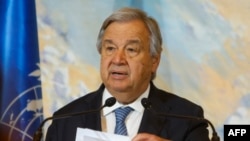The United Nations confirmed Friday that a rare meeting of global envoys with Afghanistan’s Taliban rulers this month will not address concerns about Afghan civil society and women human rights defenders.
Roza Otunbayeva, the head of the U.N. Assistance Mission in Afghanistan, or UNAMA, emphasized the importance of the world community opening a direct dialogue with the Taliban, suggesting it could create opportunities for Afghan women to participate in future talks.
“This is what is possible today. … It is a process. Let’s start to speak,” she told reporters in New York after briefing a U.N. Security Council meeting on the Afghan situation.
The two-day U.N.-hosted meeting will commence in Doha, Qatar, on June 30. It will be the third session of what is referred to as the “Doha process,” and the Taliban have agreed to attend for the first time.
“For the first time, special envoys of all the countries would meet face to face with the Taliban. They would tell them that, 'Look, it doesn’t work like this, and we should have women around the table, and also provide them with access to the business,' ” Otunbayeva said.
U.N. Secretary-General Antonio Guterres launched and hosted the Doha process in May 2023 to establish a coherent and unified global approach to engagement with the Taliban government, which has yet to be formally recognized by the world.
Guterres did not invite de facto Afghan authorities to the first meeting. The Taliban refused an invitation to the second round of talks in February unless their delegates could be accepted as the sole representatives of Afghanistan.
Human rights groups, including Amnesty International and Human Rights Watch, have criticized the U.N. for inviting the Taliban to the Doha huddle rather than holding them accountable for “crimes” against Afghan women and girls.
Otunbayeva responded to the criticism Friday, saying the U.N. would consult civil society representatives from inside and outside Afghanistan before the June 30 meeting. They also will speak to special international envoys on July 2, a day after the meeting with the Taliban ends, she noted.
Help for businesses, farmers
The UNAMA chief explained that discussions at the third Doha meeting will focus on helping Afghan private businesses, addressing financial and banking sector issues, and finding alternate livelihoods for farmers affected by the Taliban's nationwide ban on opium poppy cultivation.
She said all these issues are related to women: “There are 5 million addicted people in Afghanistan. More than 30% [of them] are women.”
Otunbayeva said the Taliban expect international assistance and capacity building in the security, agriculture and health sectors.
“What do we need [in return]? We need them to change their minds and let girls go to school. I don’t understand what is the reason why they don’t let girls go to school. There is no Islamic country out of 57 where girls don’t go to schools.”
The Taliban regained power in Kabul in August 2021 as U.S.-led NATO troops withdrew from the country after nearly 20 years of involvement in the Afghan war. The fundamentalist authorities have since barred girls aged 12 and older from attending secondary school and have suspended female students from universities as well as other higher education.
Most Afghan women are prohibited from public and private employment, including the U.N., and they are not allowed to visit public places such as parks, gyms and bathhouses. Women are required to undertake road or air trips only when accompanied by a male relative.
The Taliban dismiss criticism of their policies, insisting they are aligned with Afghan culture and Islamic law.
Agnes Callamard, the secretary-general at Amnesty International, said in a statement Friday that the credibility of the Doha meeting “will be in tatters if it doesn’t adequately address” the Afghan human rights situation and fails to engage Afghan women rights defenders.
“Sidelining critical discussions on human rights would be unacceptable and set a deeply damaging precedent,” Callamard said. She urged the international community to adopt a clear and united stance to protect the rights of Afghan women.
"Caving into the Taliban’s conditions to secure their participation in the talks would risk legitimizing their gender-based institutionalized system of oppression — a system that has sought to erase women and girls from society by callously stripping them of their most fundamental rights,” she said.
Tirana Hassan, the executive director at Human Rights Watch, described the exclusion of Afghan women from the upcoming Doha talks as shocking.
“Excluding women risks legitimizing the Taliban’s abuses and triggering irreparable harm to the U.N.’s credibility as an advocate for women’s rights and women’s meaningful participation,” Hassan said in a statement issued Friday.
VOA U.N. Correspondent Margaret Besheer contributed to this report.











